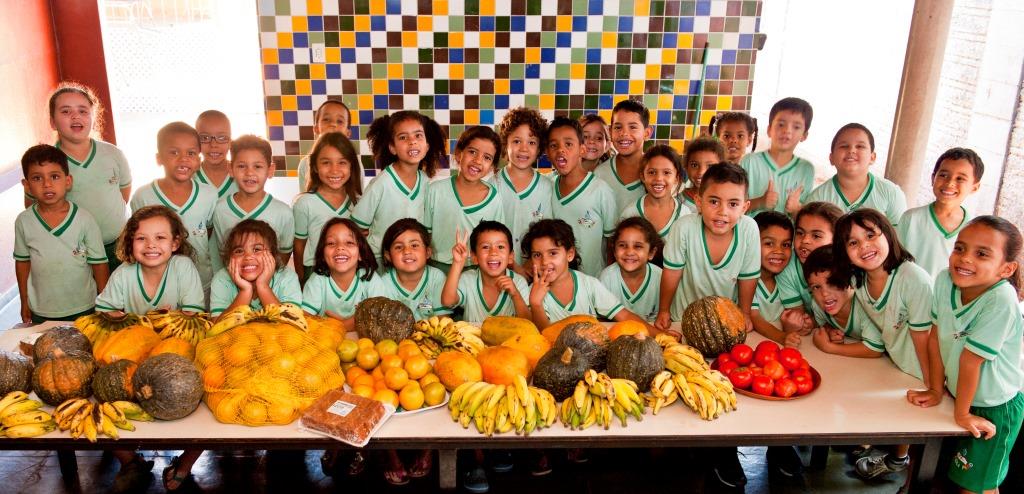Initiative that integrates the Brazil-FAO Cooperation had a panel to promote reflection and dialogue on school feeding in the region.
BRASÍLIA, November 30, 2021. School feeding in Latin America and the Caribbean was the subject of a panel at Green Rio, an international reference event for sustainable business and green economy, held between November 25 and 27 in Rio de Janeiro and broadcasted online, in a hybrid way.
With the participation of speakers from Brazil and other countries, the panel presented the main actions developed by the project Consolidation of School Feeding Programs in Latin America and the Caribbean, executed by the Brazil-FAO International Cooperation Program since 2009, and which aims to strengthen school feeding policies in the region.
Through the project, training courses are promoted for professionals such as public managers, technicians responsible for school feeding programs, among other activities, which, during the last twelve years, have contributed to a vision of sustainable school feeding as a guarantee to the right human to adequate nutrition at school. The initiative is carried out jointly by the Brazilian Cooperation Agency (ABC/MRE), the National Fund Educational Development (FNDE/MEC) and the Food and Agriculture Organization (FAO).

The panel was opened by Najla Veloso, coordinator of the regional project, highlighting the methodological axes of the work: exchange of experiences, capacity development, technical assistance to country managers and dissemination and exchange of knowledge.
The ABC/MRE project analyst, Paola Barbieri, affirmed that the Agency works to support countries in the search for solutions to their challenges, based on the development of capacities and the exchange of experiences, in a sustainable way, highlighting the results of the Brazil-FAO Cooperation in school feeding in recent years.
Bruno Silva, assistant to the coordination of the National School Feeding Program (PNAE), led by the FNDE, praised the fact that Brazil shares more than 66 years of experience in school feeding with countries in the region, contributing to the reduction of food insecurity and to guarantee the human right to food for millions of students. Silva also highlighted the importance of developing short food production and consumption circuits for the sustainability of the school feeding policy.
The FAO Representative in Brazil, Rafael Zavala, commented that schools are the main agents and means to change the food culture. “Due to the characteristics of school feeding programs, social and economic inclusion, promotion of healthy eating, combating malnutrition and job creation, the challenge we have is to turn food into a factor of change so that we can achieve the Sustainable Development Goals (SDG)”.
The panel also had a space for representatives of partner countries of the Brazil-FAO Cooperation in support of the construction and consolidation of legal frameworks for school feeding. Mario Domingo, who was director of the Coordination for the Strengthening of the Educational Community in Guatemala (DIGEFOCE), mentioned the importance of the legal framework to guarantee food for 2.5 million students in the country and thanked the Brazilian support.
He highlighted the increase in investments and the incorporation of elements of food and nutrition education in schools, encouraging the consumption of fruits and vegetables by students, which opens spaces for the formal generation of demand for products from family farmers. “Guatemala learned from the processes and experiences developed in Brazil for more than 60 years. We were one of the recipients of this experience of having a school feeding law. This process, once standardized, is very important to delimit the attributions of each actor within a legal framework”.
Verónica Sánchez, a specialist in school feeding from El Salvador, highlighted the Sustainable Schools methodology developed by the Brazil-FAO Cooperation, mentioning the support of Brazil, starting in 2009, for the structuring of a healthy and sustainable school feeding strategy, and that improved food security in the country. “Brazil has been very important because it accompanies us on this path. Brazil has years of experience in this area and, for us, it is a great advantage to have this model.”
“It is an honor for all Brazilians to know that our brotherhood, by making our policies available, has such a beautiful impact on the countries, each one at its time, within its sovereignty and in the principle of horizontality established by International Cooperation” , commented Najla Veloso, who also added the role of Sustainable Schools, which are a way of working locally and scaling up in politics at the national level.
Finally, María Beatriz Costa, coordinator of Green Rio, praised the level of the discussions. “This panel shone a light of hope. I can only thank each and everyone who participated. FAO, more than ever, is the engine that will help make the changes we need.”






